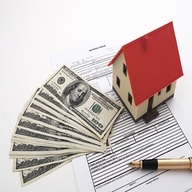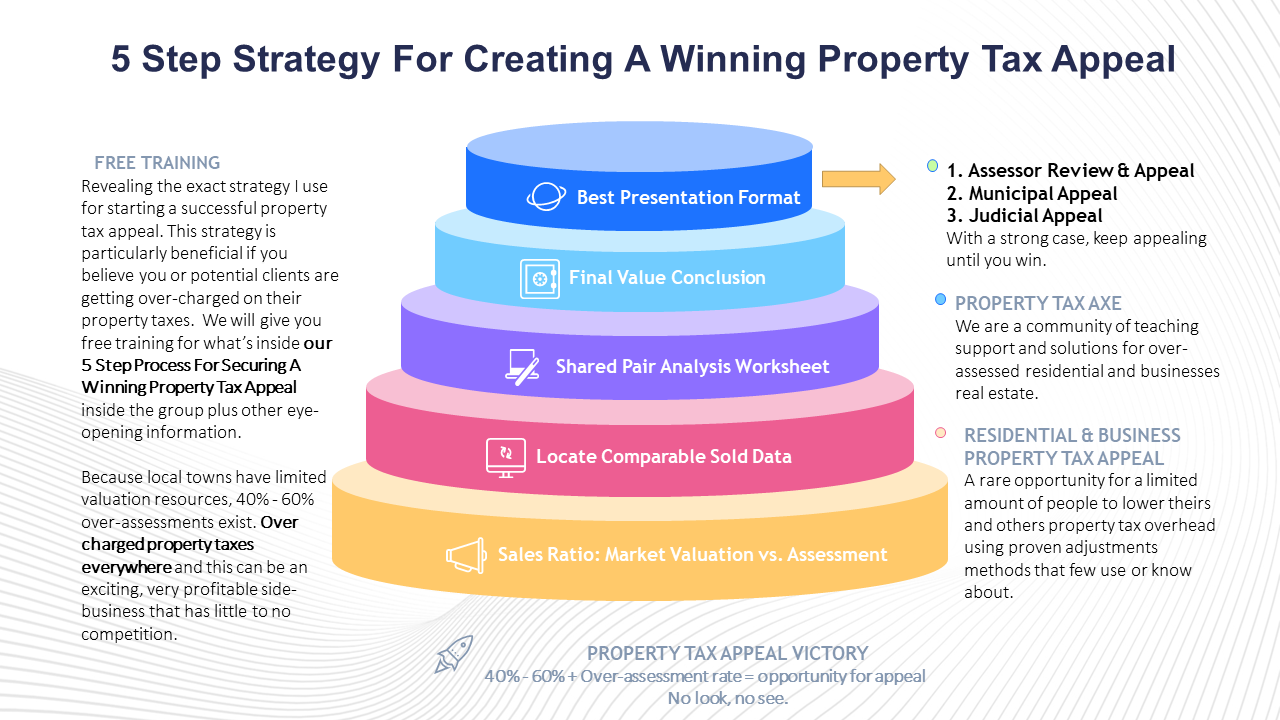Every town needs to fund their employees, garbage collection, the road department, teachers, police, etc. and that’s accomplished by levying taxes on the total valuation of real estate within their jurisdiction. That valuation is passed on to the property owner thru a yearly property tax assessment.
The local area’s property tax levy amount can be found on the towns website and is usually represented as a percentage. In order to estimate the property tax on a property, multiply the assessed value of that home by the area’s property tax levy.
To fairly distribute that tax, a town or county blanket property tax assessment is conducted. Because it is a great expense, that blanket assessment might be conducted every 8 to 20 years or more.

Because a newly sold home is most demonstrative of the true market value for that real estate, a sales ratio is applied to homes corresponding to the blanket assessment year. Recently appraised properties are more accurate and closer to the dollar current worth than properties which have not been evaluated lately. In other words, the latest estimate is certainly closer to being genuine than an aged estimate.
Most homeowners are not aware of that sales ratio and assume that their assessed valuation is equal to what the true market value the town placed on their home. It is not; assessed value is not true market value.
Assessed Value vs Appraised Value
Assessed value is not appraised value. The appraised valuation of a property is the result of careful analysis by a licensed real estate appraiser which generally costs between $300 to $550.
An assessed valuation is a valuation placed on a property from a blanket appraisal that might have been conducted many years ago. The proposal for a blanket assessment for a town or county is placed on a bid basis. The low-cost bidder wins the contract.
The work has to be done fast and cheap for the blanket appraisal winner to make a profit; the steps that a licensed real estate appraiser would follow are skipped. Many errors and miscalculation result.
To equalize an assessed value done years ago, the tax assessor employs a sales ratio. The formula for assessed value is that blanket apprised valuation done years ago TIMES the sales ratio.
Appraised Value vs Market Value
When determining what market value is compared to appraised value, the main difference is who is determining the value. Market value is determined in a free market of buyers and sellers. Appraised value is determined by a licensed real estate appraiser.
Real estate is a market, somewhat like the stock market. Real estate prices can go up for years as well as go down for many years. For instance, Los Angeles real estate bubble tripled from 1997 to 2006 and then fell 40% from the peak.
Real Estate Property Tax Exemptions
There exist property tax relief programs for a town, county or state to take advantage of if you qualify. These deductions for exemptions can lower your overall property tax.
- Homestead Tax Rebate
- Senior Home Tax Exemption or Freeze
- United States Service Veterans Property Tax Deductions
- Senior Citizen Deductions
- Exemptions For Maimed and Disabled Citizens
Property Tax Assessment Appeal
Armed with the fact that assessed value is not market value, one might want to find out exactly what the tax assessors figures are for the worth a property. What does the taxing authority believe your home is really worth being that assessed value is NOT market value?
Again, assessed value divided by sales ratio equals what the tax assessor thinks your property is worth; that is the price you’re taxed on.
You’ll need to know the sales ratio. To determine this, call the municipal taxing authority where you live and request the taxes assessor’s workplace. Inquire for the sales ratio for the assessed year.
This sales ratio can be called, depending on the jurisdiction, the average ratio, assessment level, director’s ratio, the common level of 100% of accurate worth, RAR (residential evaluation ratio) or the equalization price (which might not often become comparable to the currant sales ratio).
Calculate the total assessed value of your home and house (add them) and divide the total assessed value of your home by the sales ratio to determine what your tax appraiser feels your home and property are worth.
After you have identified this, you will end up being equipped with a valuation to compare to other equivalent properties so you can make a determination if you are over assessed or not.
Real Estate Sold Prices
As a service, the homepage of this website offers information so you have free access to comparative sold real estate properties in your area for your type of home. Along with this they offer a free comparative analysis worksheet as well as an overview guide to determine the valuation of a property.
With that information, you can compare that estimated market value for your subject home to the figure that the tax assessor came up with. If the difference is great enough to be worth your time to obtain justice, proceed with an appeal.
Take into consideration, if you won a property tax appeal for only $500. Your property tax assessment has been reduced by $500. If the town does not conduct a blanket reassessment for 10 or more years, you’re looking at $5,000 savings that’s in your wallet.

Questioning If You Have A Property Tax Appeal Worth Pursuing
Right off the bat, when you find your property tax assessment notice in the mailbox, check the filing deadline. If you’re going to challenge the assessed value on your home be aware of the deadline, it could be only a few weeks. If that’s the case you have to dig out the results quickly.
Google: “Property Record Cards” for your town. Research the Property Record Card on the county web site. See what the square footage and statistics reveal on that property record card. Does it jive with what your dwelling presents? For instance, living space is heated living space. If an unheated porch or garage are included (heated living space is assessed much higher that unheated living space), that is an issue.
Find the sales ratio (sales ratio percentages change – considering that the original reassessment date might be 10 years old, that percentage instead of being 100% might be 87%).
Next, do an analysis to discover what a town or county actually is the exact worth of the property. Assessed value might not be its actual market value. The total assessed valuation placed on your house and property tax assessment … divide by the sales ratio … is the actual price that the town or county is saying is the worth of that property.
- Make a comparative analysis of like houses and properties. Use similar location, square footage and as many similar variables that the subject property possesses.
- If there is big enough gap, make a property tax appeal!
Property Valuation Analysis For Comps
Concentrate on finding comparable sales that have characteristics similar to those of your own home. A variety of these parameters are listed below in descending rank of importance, the first listed being more important than the last listed.
Categories of Compatibility
• similar neighborhood to the subject home
• total square feet of living space
• number of rooms, bedrooms, baths
• sold within 12 months prior to the annual assessment date, preferably within 4 months of it
• sales price within general market price of subject
• sales or financing concessions (example: buyer and seller can renegotiate who pays fees and closing costs)
• location
• quality of construction
• style house
• age of house
• condition of house
• square footage property site and view
• functional utility (homes ability to adequately provide usefulness via access for intended use)
• number of garages
• swimming pool, fireplace(s), remodeled kitchen, kitchen equipment, etc.
• storm windows or replacement windows or thermopane windows
• basement i.e. finished, unfinished or none
• deck, patio, porch, sauna, etc.
• landscaping that’s similar

The Adjustment Real Estate Valuation Process
Because properties are seldom alike, it will be necessary to make adjustments between the comparable properties as compared to the subject property (your property). This process equalizes the properties in the comparison. An adjustment is “a decrease or increase in the sales price of a comparable property to account for a feature that the property has or does not have in comparison to the subject property.”
In other words, the comparable properties are adjusted to reflect the value of the subject property. You never adjust the subject (your own home). If two houses were identical in every way except that the subject (your house) had a deck and the comparable did not, the value of the comparable would be adjusted upward.
Take time to browse market analysis pages in order to gain familiarity with the sample market analysis layout. By this method, the subject (your house) reflects more value when compared to a comparable house with deficient items (such as no deck or no garage). Always remember: comparable sales must be adjusted and not the subject property. “The subject property is the standard against which the comparable sales are evaluated and adjusted.
Thus, if an item in the comparable property is superior to that in the subject property, a minus (-) adjustment is required to make that item equal to that in the subject property. Conversely, if an item in the comparable property is inferior to that in the subject property, a plus (+) adjustment is required to make that item equal to that in the subject property.”
In other words, if a comparable sale property has a major improvement that your property does not have, make a minus adjustment. On the other hand, if you enjoy a major improvement and the comparative sale property does not, make a positive adjustment.
Round off adjustments to the nearest $100. Your adjustments are based on market data and supported by market evidence.[1]
LIMITS FOR ADJUSTMENTS
Gross adjustments, that is the total individual adjustments measuring differences in any given comparable to your house and lot, should be no greater than 25% of the sales price. Any net adjustment, that is any individual adjustment reflecting a difference between the comparable and your house and lot, should be no greater than 15% of the sales price.[2] Remember, the more the comparables are like your house, the less adjustments will be necessary and the more accurate the appraisal will be. To avoid scrutiny, it is best that individual adjustments not be above 10%. Large adjustments indicate incomparable sales. If a large adjustment is necessary, an addendum narrative with explanations and evidence should be included.
Examples of some typical adjustment figures for dissimilarities between a subject property and its comparables, are given throughout this book for houses of average quality. Nevertheless, you must determine what is realistic for your particular property and appropriate for your area.
PROPERTY TAX APPEAL WITH PROPERTY TAX ASSESSOR
In many areas of the country you have months to appeal your assessed property valuation. Be aware of your appeal deadlines for lowering your property tax assessment.
With your evidence, schedule a meeting with your appeal in person to the property tax assessor. The burden of proof is on the taxpayer to challenge the assessment. The procedure for filing an appeal varies, but generally it may be a good idea to bring your appraisal findings to the attention of your local tax assessor. Find out if you have to file a formal appeal before setting up an informal hearing. Many jurisdictions have provisions for informal hearings if a formal appeal is not filed. In some states this may involve a County Tax Review Board sometimes composed of the same members as your town council. Pay special attention to the filing deadline!
Most tax assessors are competent people just trying to do their job. They realize that inequities exist because they do not have the staff to conduct comprehensive individual assessments. Some tax assessors, however, can be difficult and will never agree with you because they think their job is to preserve the aggregate tax base and will fight not to lower your property tax assessment.
The County Tax Review Board Appeal
If no results come out of your encounter with the tax assessor, you should appeal to the County Tax Board (may be called the Board of Review, County Board of Taxation, Board of Equalization, etc.). Be sure to respond by the proper filing date. The appeal process begins when the assessment notices are sent out, and it is your responsibility to respond by deadline dates. Obtain a copy of the particular instructions for filing an appeal petition and copies of the filing forms from the County Board of Taxation or ask your tax assessor where you can obtain them.
Be sure to file your original petition with the County Tax Board and any copies that may be required by the municipal tax assessor and clerk of your municipality as specified in your instruction form. Be sure to read the preparation instructions carefully. Heed time restraints.
In some states you may have to include copies of your residential market analysis and copies of photographs of your property and the comparables (sometimes 3 or more copies, one for each board member) at least l week before the hearing or within the time restraints given by the County Tax Board. These extra copies for review board members are so they can follow your line of evidence when you have the opportunity to present it. Make sure your taxes are paid up to date; failure to comply may result in dismissal of your petition.
After filing your petition, you will receive notice through the mail of your hearing date. Adjournments (postponements) are not granted unless under extraordinary circumstances. Try to attend an appeal board hearing before your scheduled date to get a feel for what to expect.
When you arrive at the location of the public hearing, your attendance will be noted. The town will usually hire an attorney to represent the town. The town tax assessor and town attorney will be present at the hearing in an adversarial role to challenge your evidence wherever they can. When you are called to testify, you will be sworn in. Your judges will be the members of the Tax Review Board (be they one or 20 in number).
The board usually consists of 3-5 members who have a knowledge of property values. Members are appointed by the legislative body (town board, city council, etc.) of the local government. The tax assessor and town attorney are not part of the Board of Review since the Board of Review’s purpose is to ensure that you receive an impartial decision. Using a boxing match as an example, it is you against the tax assessor and town attorney with the Review Board judging, deciding the match. Theoretically, it is the facts that rule, not the board and not the assessor.
You will undoubtedly have the opportunity to listen to other people appealing their assessments before you and to become somewhat more familiar with what the Board of Review is looking for. The average meeting lasts only 10 to 15 minutes. When you have your turn, read your prepared ‘appraisal’ presenting only the information that supports your case to the members of the appraisal board.
Remember: the appeal board members are the ones who decide the case on the county level, not the adversarial tax assessor or the town attorney. Never tell the board or the tax assessor that you are appealing your taxes – you are appealing your assessment. You are seeking equalization in assessment to similar properties such as yours.
Property Tax Appeal Tips When Meeting At Civil Board Hearing
Challenge the assessor for a written copy of the comparables he has chosen. Ask him how he arrived at an adjustment. Ask for figures, rattle his cage. If his square footage figures appear questionable, ask if they include the dimensions of the garage, porch, attic (if they have these features).
Ask to see photographs of the comparable properties he has chosen. In most every case, the tax assessor doesn’t have any pictures; it is not their practice to take pictures. Refer to your photos as being the best.
You must be able to show that the value judgement the tax assessor placed on your property was in error. If the town attorney cannot discredit your major points, he may try to exaggerate minor points. Listen carefully, speak carefully.
Explain if there are inaccuracies, computational errors, or mistakes in the property record card, and proceed with the residential market analysis underscoring each value adjustment.
For example, emphasize that the comparables you have chosen are the most recent in date of sale to the assessment date and most similar to your residence because they mirror a similar neighborhood, exemplify a similar number of bedrooms, typify similar square footage, etc. Be sure you can back up your facts to be credible.
Your adversaries (the tax assessor and town attorney) may try to question your expert witness status. You can reply that there is no one better qualified than yourself to be an expert witness in your own neighborhood.
You’ve lived there for years, have traveled the streets and compared other neighborhoods to your own, scrutinized improvements and detractions, attended “open houses” hosted by real estate agents, witnessed comparable properties that were bought and sold. You’ve analyzed and reviewed all the comparable houses that sold in the last year listed in the Multiple Listing Service “sold” directory. You’ve absorbed and complied to rules, regulations and guidelines set by the Federal National Mortgage Association (FNMA or Fanny Mae), the Federal Housing Authority as well as other Federal agencies (Farmers Home Administration or FmHA), etc. by using acceptable market valuation rules and principles.
You’ve consulted real estate agents, appraisers and/or the tax assessor in your local area for determinations on questionable items of value. You know what contractors charge for a specific enhancement, you know how to calculate depreciation. You have supporting evidence for all your adjustments. So, in what area do you lack expertise?
The attorney for the town or the town tax assessor may try to point out contradictions, oversights or poor estimations of value based on the information they have uncovered. They may use questions of little importance or insinuations in an attempt to get a hurried reply that can be used against you. For instance: they may try to imply that the purchase price or the amount for what the house is insured is a valid representation of market price. This type of reasoning is irrelevant to the fair market price.
Only a market analysis earmarking a specific time period, using similar and comparable properties, is a supportable and valid method for determining probable selling price. By using the market value approach, you can be an expert in your own neighborhood in determining the market value of your home. Remember, who is better qualified than you since you live and observe the neighborhood influences daily? The only contentious issue should be the value of an individual adjustment.
They may want to show that you have chosen poor comparables, are unfamiliar with the comparables, not sure of the adjustments, that you are foolish or incompetent. Have an idea about what you are going to say before you speak, and let there be no doubt in your audience’s mind (or your own!) that you are certain of the facts. Expect interruptions from the opposing town attorney when they do not like the testimony you are giving. If the town attorney gets argumentative and makes you feel uncomfortable, you can object to the Tax Board that you are indeed being harassed or at least that the town attorney is being argumentative.
It’s said that “Fate loves the fearless.” The success of your property tax assessment appeal depends on the impression of believability just as much as it depends on the facts and supporting evidence. You have to confidently assert the facts without lecturing, showing disrespect or becoming emotional.
Eye contact with the Board of Review is mandatory. In public speaking, the best way to reduce your nervousness is to be thorough in your preparation and well-rehearsed. Be completely familiar with the facts.
The tax assessor is unusually burdened this time of the year and may not have chosen representative comparables or spent much time preparing evidence. Often his adjustments are poorly derived or are inappropriate or incomplete. Point out and question any unsimilar characteristics. Point out differences in date of sale, location, site, or any feature that is not comparable to yours.
Real Estate Valuation & Property Tax Appeal Training Course
Lastly, if you want free comparable analysis worksheet, free access to comparable sold home for your area data as well as a complete free walk trough of this process, visit the homepage of this site.
Also, if this might be an interest to you for helping friends, family or clients, visit the homepage. The Real Estate Valuation & Property Tax Appeal Training Course is a low-cost professional course for helping over-assessed victims be they residential or commercial.
Lean More Facts and Details, Click: DIY Property Tax Appeal

[1]Shenkel, William M., Real Estate Appraisal, South-Western Publishing Co., 1992, p. 478.
[2]Fannie Mae Guidelines, Section 408.02, Sales Comparison Analysis.